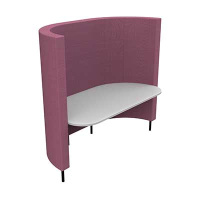Corrals
In the dynamic and often expansive environments of modern offices, schools, and libraries across the UK, corrals represent an ingenious and flexible approach to space division and user experience. Unlike fully enclosed pods, corrals are typically semi-enclosed structures or modular systems designed to define smaller, more focused zones within a larger open area, offering a sense of privacy and acoustic comfort without complete isolation.
The range of corrals is diverse, tailored to various needs. Individual study carrels are a classic form of corral, often found in libraries and academic settings. These are small, three sided enclosures, providing a private nook for focused reading, research, or solo work, minimising visual distractions. In offices, solo focus corrals might be higher-backed seating units or desktop screens that create a personal, semi private workspace. For collaborative needs, team corrals or huddle corrals typically consist of U shaped or circular arrangements of high backed benches or partition walls, often enclosing a table. These are perfect for small, informal team meetings, quick brainstorming sessions, or semi-private discussions, allowing collaboration without disturbing the wider environment. Some corrals integrate shelving, whiteboards, or acoustic panels within their structure to enhance functionality and sound dampening. Materials can range from upholstered panels to wooden slats or even frosted glass, balancing privacy with an open feel.
These versatile corrals are increasingly vital in open-plan offices, university libraries, school common rooms, and co-working spaces throughout the UK. Their primary use is to break down large, undifferentiated areas into more manageable and purposeful zones. They provide a sense of personal space, reduce visual clutter, and offer a degree of acoustic absorption, making environments more conducive to concentration and small-group interaction.
Organisations should invest in corrals for several compelling reasons. Firstly, they optimise space utilisation by intelligently segmenting large areas, allowing for diverse activities to coexist without costly or disruptive permanent construction. Secondly, they enhance productivity and focus for individuals by reducing distractions and providing a sense of enclosure. Thirdly, for teams, they facilitate impromptu collaboration and private discussions without the need to book formal rooms, promoting agility and efficiency. Lastly, corrals contribute significantly to user well-being by offering choice in work or study settings and providing visual and acoustic comfort, making environments less overwhelming and more supportive. Their modularity also ensures future adaptability to changing needs.
The range of corrals is diverse, tailored to various needs. Individual study carrels are a classic form of corral, often found in libraries and academic settings. These are small, three sided enclosures, providing a private nook for focused reading, research, or solo work, minimising visual distractions. In offices, solo focus corrals might be higher-backed seating units or desktop screens that create a personal, semi private workspace. For collaborative needs, team corrals or huddle corrals typically consist of U shaped or circular arrangements of high backed benches or partition walls, often enclosing a table. These are perfect for small, informal team meetings, quick brainstorming sessions, or semi-private discussions, allowing collaboration without disturbing the wider environment. Some corrals integrate shelving, whiteboards, or acoustic panels within their structure to enhance functionality and sound dampening. Materials can range from upholstered panels to wooden slats or even frosted glass, balancing privacy with an open feel.
These versatile corrals are increasingly vital in open-plan offices, university libraries, school common rooms, and co-working spaces throughout the UK. Their primary use is to break down large, undifferentiated areas into more manageable and purposeful zones. They provide a sense of personal space, reduce visual clutter, and offer a degree of acoustic absorption, making environments more conducive to concentration and small-group interaction.
Organisations should invest in corrals for several compelling reasons. Firstly, they optimise space utilisation by intelligently segmenting large areas, allowing for diverse activities to coexist without costly or disruptive permanent construction. Secondly, they enhance productivity and focus for individuals by reducing distractions and providing a sense of enclosure. Thirdly, for teams, they facilitate impromptu collaboration and private discussions without the need to book formal rooms, promoting agility and efficiency. Lastly, corrals contribute significantly to user well-being by offering choice in work or study settings and providing visual and acoustic comfort, making environments less overwhelming and more supportive. Their modularity also ensures future adaptability to changing needs.

The Delia Desk and Screen Work Booth isn't available to purchase online as there are many different options available to make these office booths fit your companies requirements. If you are interested in the Delia Desk and Screen Work Booth then please email us for more information and a full quotation.
Enquire
£1,473.60 Inc VAT
Delia Desk and Screen (STELLA-DEL-DESK)
The Delia Desk and Screen Work Booth isn't available to purchase online as there are many different options available to make these office booths fit your companies requirements. If you are interested in the Delia Desk and Screen Work Booth then please email us for more information and a full quotation.
Enquire
£1,473.60 Inc VAT




















